2023届高考英语二轮复习: 名词 课件( 33张ppt)
文档属性
| 名称 | 2023届高考英语二轮复习: 名词 课件( 33张ppt) | 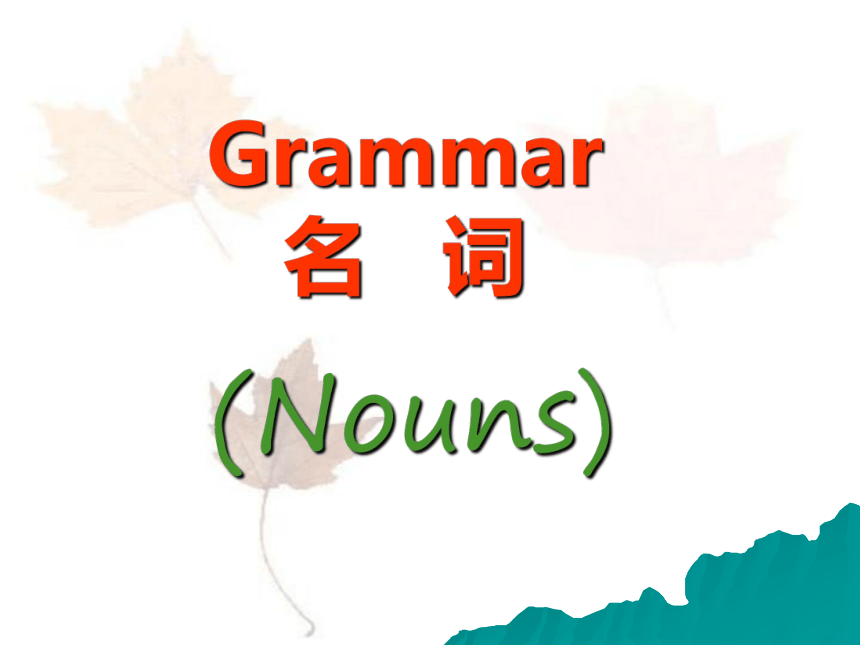 | |
| 格式 | pptx | ||
| 文件大小 | 1.7MB | ||
| 资源类型 | 教案 | ||
| 版本资源 | 通用版 | ||
| 科目 | 英语 | ||
| 更新时间 | 2023-03-13 19:42:50 | ||
图片预览

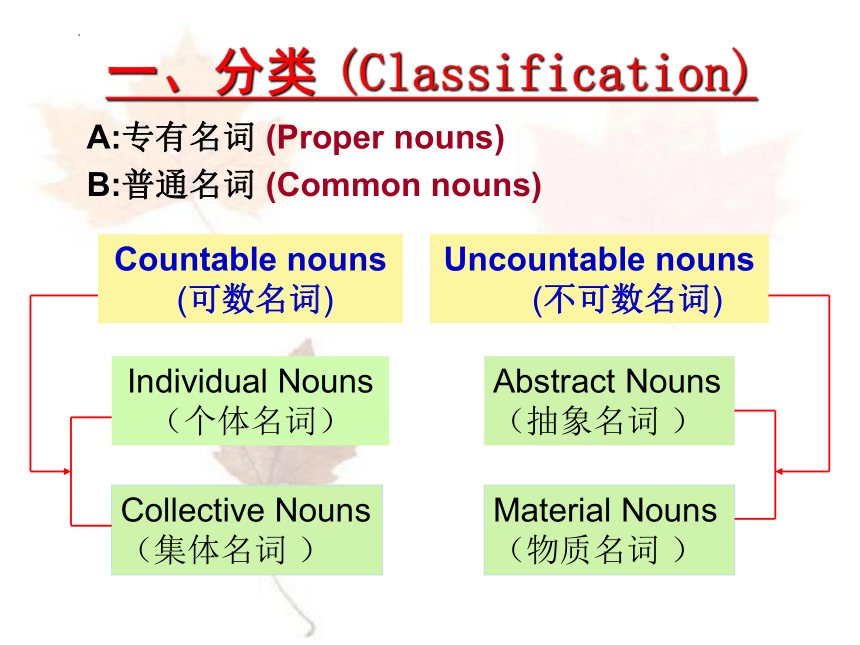
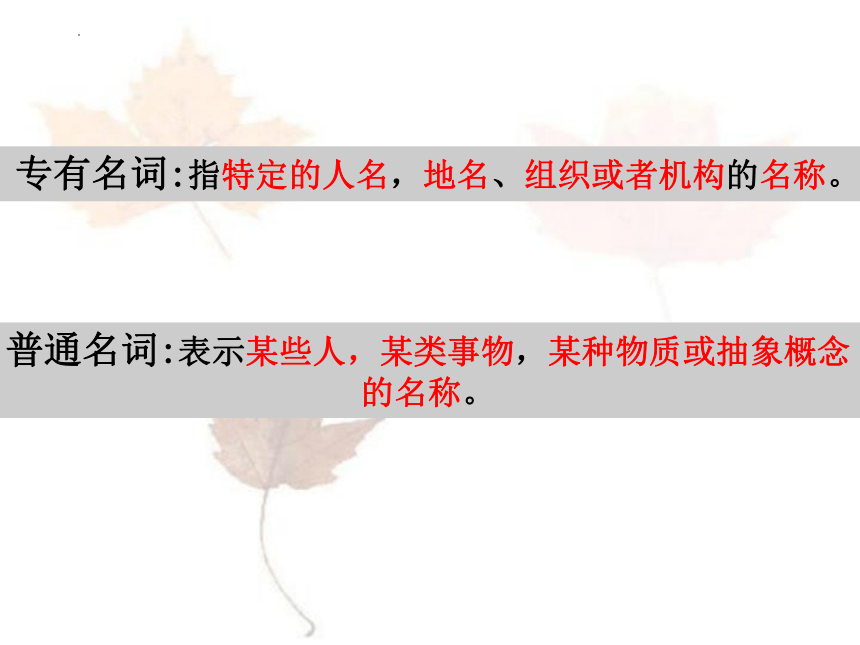
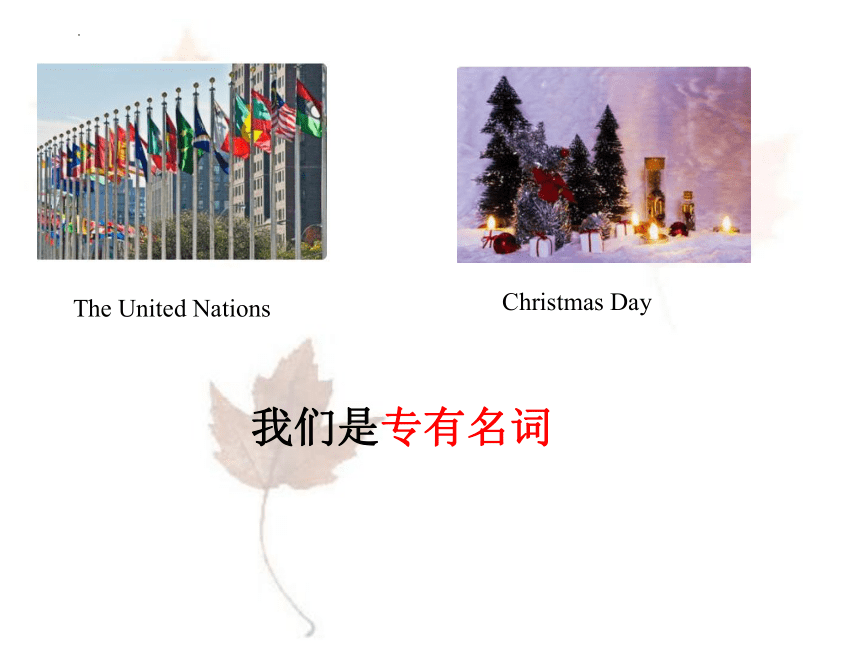
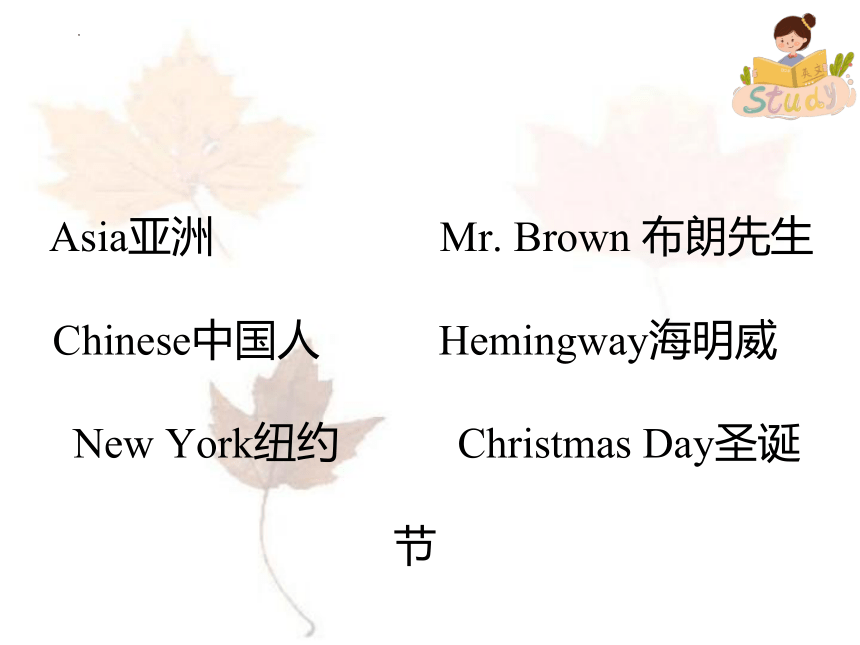
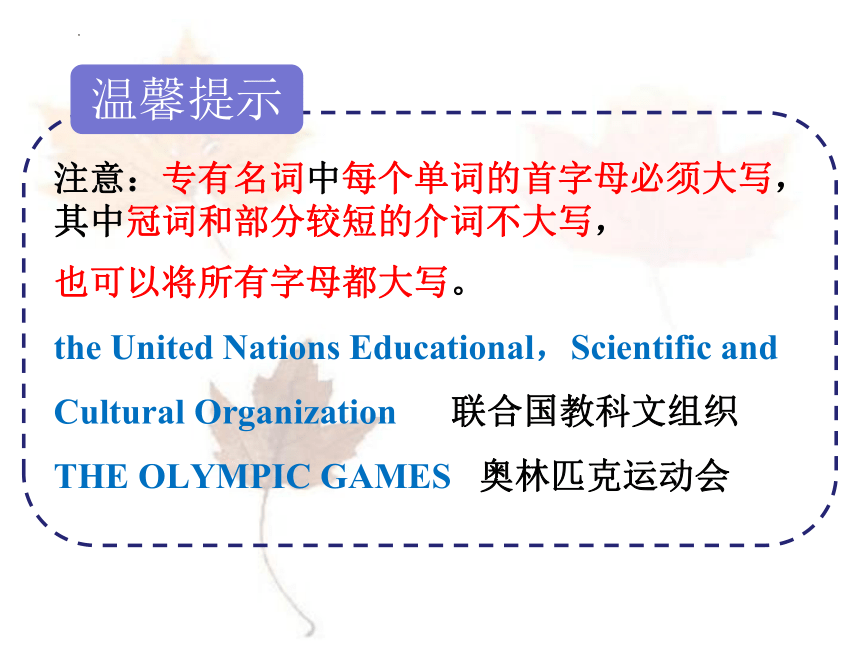
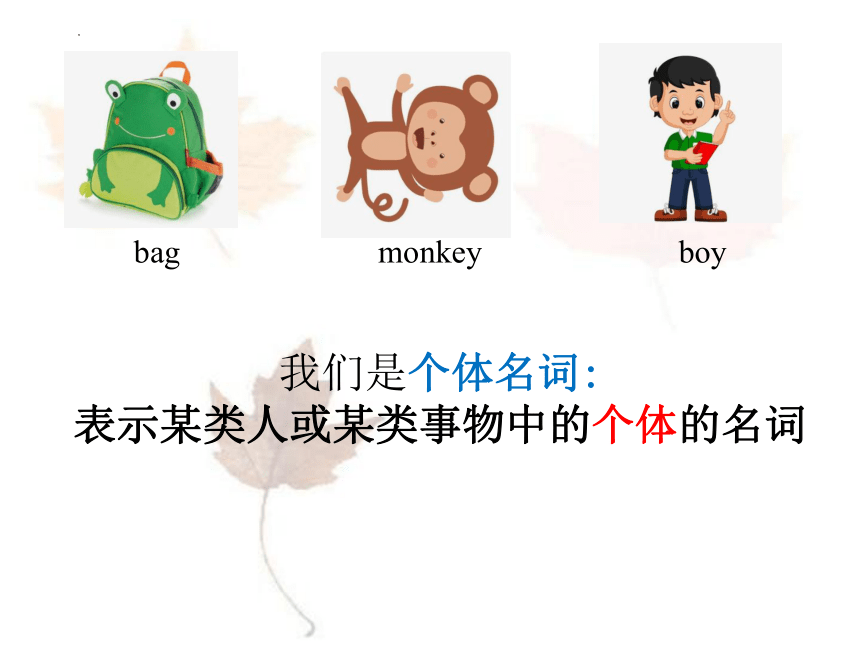
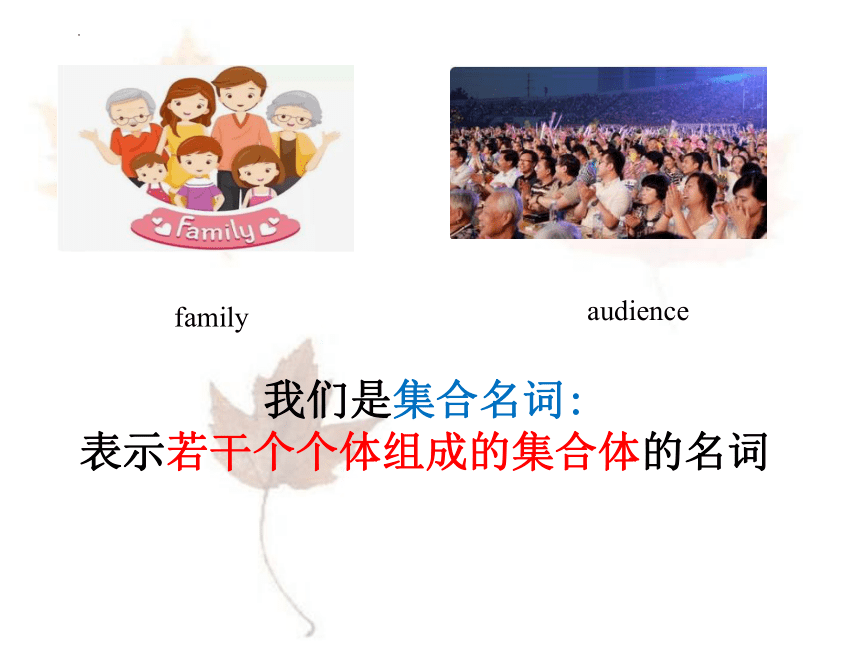
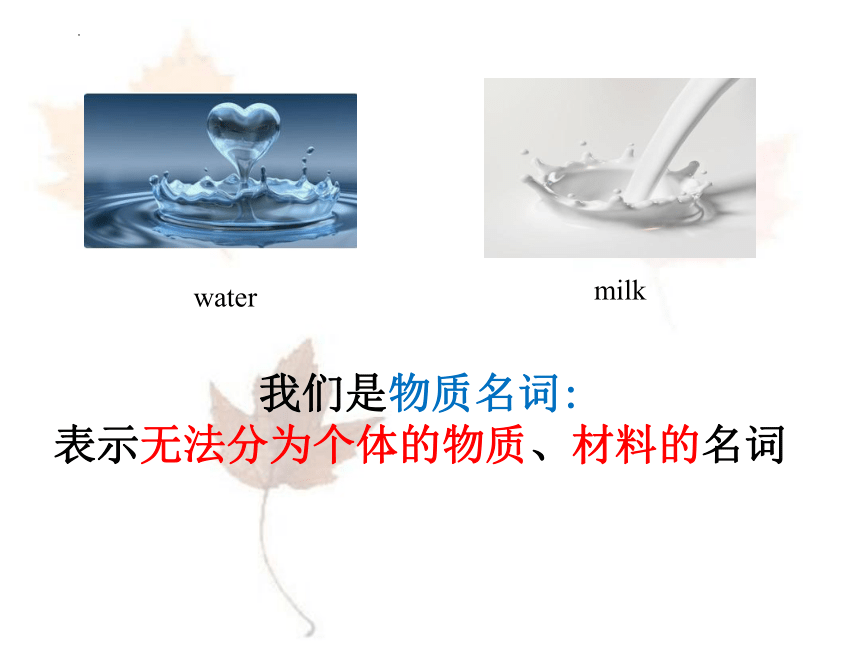
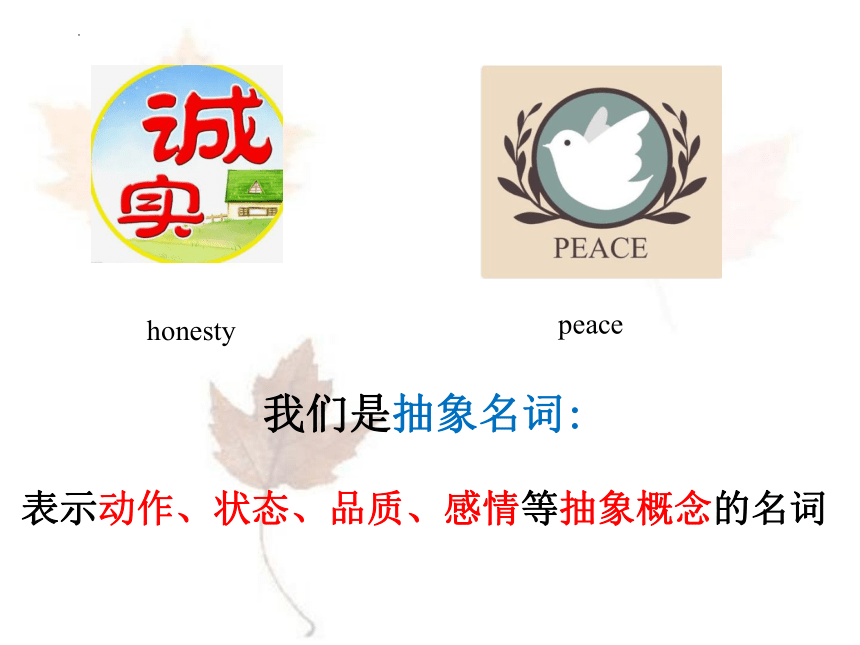
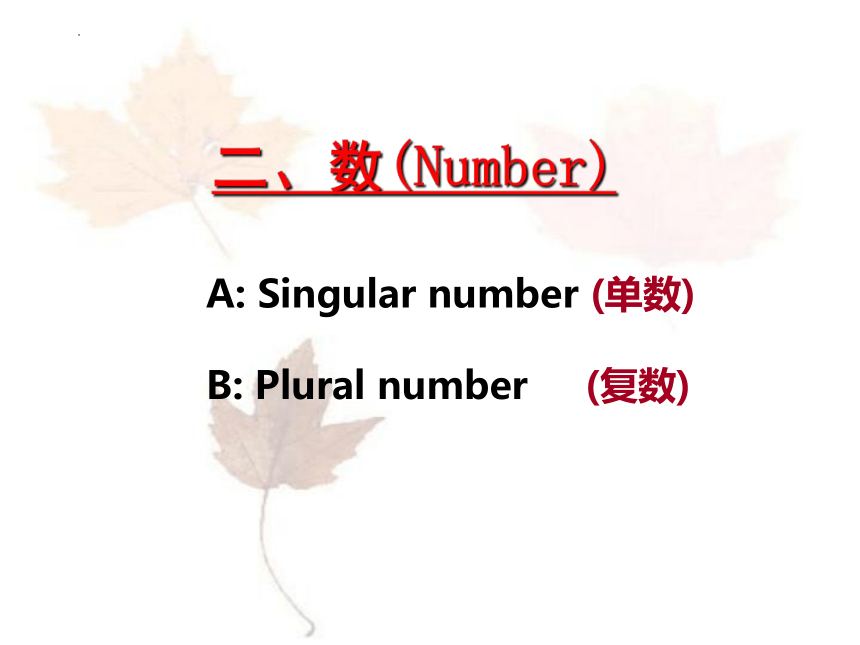
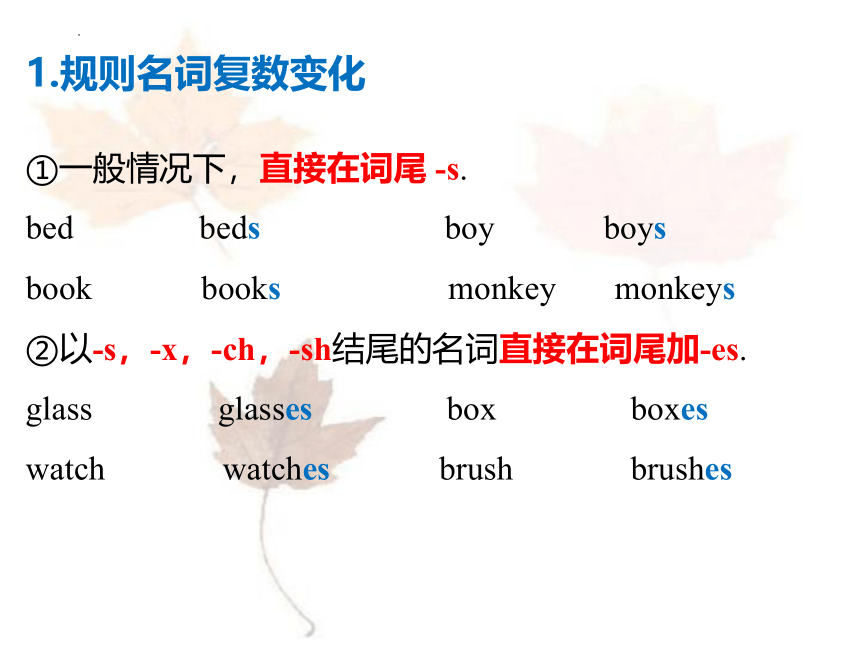
文档简介
(共33张PPT)
Grammar
名 词
(Nouns)
一、分类 (Classification)
A:专有名词 (Proper nouns)
B:普通名词 (Common nouns)
Countable nouns
(可数名词)
Uncountable nouns
(不可数名词)
Individual Nouns
(个体名词)
Collective Nouns
(集体名词 )
Abstract Nouns
(抽象名词 )
Material Nouns
(物质名词 )
普通名词:表示某些人,某类事物,某种物质或抽象概念的名称。
专有名词:指特定的人名,地名、组织或者机构的名称。
The United Nations
Christmas Day
我们是专有名词
Asia亚洲 Mr. Brown 布朗先生
Chinese中国人 Hemingway海明威
New York纽约 Christmas Day圣诞节
注意:专有名词中每个单词的首字母必须大写,其中冠词和部分较短的介词不大写,
也可以将所有字母都大写。
the United Nations Educational,Scientific and Cultural Organization 联合国教科文组织
THE OLYMPIC GAMES 奥林匹克运动会
温馨提示
我们是个体名词:
表示某类人或某类事物中的个体的名词
bag
monkey
boy
我们是集合名词:
表示若干个个体组成的集合体的名词
family
audience
我们是物质名词:
表示无法分为个体的物质、材料的名词
water
milk
我们是抽象名词:
表示动作、状态、品质、感情等抽象概念的名词
honesty
peace
二、数(Number)
A: Singular number (单数)
B: Plural number (复数)
①一般情况下,直接在词尾 -s.
bed beds boy boys
book books monkey monkeys
②以-s,-x,-ch,-sh结尾的名词直接在词尾加-es.
glass glasses box boxes
watch watches brush brushes
1.规则名词复数变化
③以“辅音字母+y”结尾的名词,变y为i,再加-es.
baby babies lady ladies
factory factories difficulty difficulties
④以“辅音字母+o” 结尾的名词,一般直接在词尾加-es.
hero heroes potato potatoes
tomato tomatoes volcano volcanoes
⑤以-f或-fe结尾的名词,变f或fe为v,再加-es.
life lives thief thieves
knife knives wolf wolves
特别注意:
以-f或-fe结尾的名词,变复数直接加-s的单词:
roof roofs chief chiefs
proof proofs gulf gulfs
①改变元音字母
man men tooth teeth
woman women goose geese
②词尾变化
child children ox oxen
③单复数同形
sheep deer Chinese fish
means species Swiss series
拓展:一些英语外来词的不规则复数形式
analysis analyses basis bases
crisis crises medium media
2.不规则名词复数变化
①含有名词的复合名词应在主体名词部分加-s.
runner-up runners-up 亚军
passer-by passers-by 过路人
editor-in-chief editors-in-chief 总编辑
brother-in-law brothers-in-law 姐夫
②无主体名词的复合名词,在词尾加-s.
grown-up grown-ups 成年人
hang-up hang-ups 障碍
go-between go-betweens 中间人
3.复合名词复数变化
③由man,woman构成的复合名词,
前后都需变为复数形式
man doctor men doctors
woman driver women drivers
④一部分以man,woman结尾的合成词,
在变为复数时与man,woman的变化形式相同
policeman policemen
gentleman gentlemen
特别注意:这两个不是合成词,直接在词尾加-s.
human humans German Germans
不可数名词没有复数形式,其前不可以加不定冠词
但是,也有几个例外:
1)当物质名词为份数时,可以有单复形式。
Chinese is famous for tea.(tea为 物质名词,不可数)
Two teas,please.(=two cups of teas,tea 表示份数)
2)当物质名词表示数量的巨大或范围较广时,可用作复数形式。
Water is made up hydrogen and oxygen.
(water 是物质名词,不可数)
Part of the waters of the Yangtze River have been polluted.
(waters 表示大范围的水域,用复数形式)
4.不可数名词
3) 有些抽象名词在一定语境下,可以用做可数名词,
这种现象叫抽象名词具体化
抽象名词(不可数) 具体化(个体名词,可数名词)
in surprise a surprise 一件令人惊讶的事
win success a success 一件成功的事
win honor a honor 一件引以为荣的事
encounter failure a failure 一个失败者
youth a youth 一个青年人
have pity on sb. a pity 一件令人可惜的事情
with pleasure a pleasure 一件令人高兴的事
①抽象名词用来表示具体的人或事
Knowledge is very useful any time and anywhere.
(knowledge是抽象名词,前面不加冠词)
After having traveled to many places,she has a good knowledge of China.
(knowledge和不定冠词连用,表示某方面的具体知识)
②有些抽象名词与形容词连用时,前面需要加不定冠词
He seldom took part in these entertainment programs before,
but now he takes an active part in a talk show.
5.抽象名词
Experience is the best teacher.
(experience意为“经验”,是不可数名词)
To most young people,surfing and bungee jumping are
both exciting experiences.
(experience意为“经历”,是可数名词 )
6.名词既可数又不可数
拓展:不可数名词可以借助表示数量单位的名词表示数量“一”
a piece of paper 一张纸 a glass of water 一杯水
a loaf of bread 一条面包 a piece of furniture 一套家具
a piece of advice 一条建议 a piece of information 一条信息
(1)绝对不能与不定冠词连用的名词
weather天气 fun 乐趣 space天空
luggage行李 information信息 advice建议
word/news消息 bread面包 wealth财富
例:Beyond the stars,the astronaut saw nothing but space.
7.部分名词习惯用法
(2)通常只以复数形式出现的名词
trousers裤子 clothes衣服 compasses圆规
(3)有些名词表面为复数形式,实为单数
politics政治 physics物理 news新闻 mathematics数学
拓展:以复数形式出现的国名、书名、报刊名等视为单数。
the United States. 美国 New York Times纽约时报
群岛、山脉、亚运、奥运等名词视为复数,
the Rocky Mountains(落基山脉)
the Olympic Games(奥林匹克运动会)
(4)变为复数形式,意义不同的名词
paper纸张 papers文件 time时间 times时代
content容量 contents目录 work工作 works作品
arm胳膊 arms武器 custom习俗 customs关税
good好处 goods货物 water水 waters大片水域
It is the custom of foreigners to do so.
Did you have any trouble with the customs?
I hurt my arm. There’s a lot of blood.
Take up arms against the enemy.
三、名词的格 (Case)
A:通格(Common case):
主格 (Subject case)
宾格 (Object case)
B:所有格(Possessive case)
1. ~’s 属格:
原则上只用于表示有生命的人或物的名词。
如:the teacher’s book; the horse’s tail
然而,时间、距离、太阳、地球、月亮、江河、
海洋、船只、国家、城市、团体机构等名词也
可以用~’s属格。
如:today’s newspaper; the city’s transportation
① 一般的名词,包括不以s结尾的复数名词,
在词后加’s。如:the children’s book
② 以s结尾的复数名词的所有格形式只在词后加~’。
如:the teachers’ office
③ 以s结尾的专有名词的所有格,既可加~’s
也可加~’。如:Engels’(s)letter
④ 两者或两者以上共有的所有格形式只在后者用
所有格形式,如:Tom and Mike’s room
若表示分别拥有时,则要在每个名词后用
所有格形式,如:Tom’s and Mike’s rooms
2. of~属格:
多用于无生命现象的名词, 也可用于有生命现象的名词;当一个名词有较长的定语时,就只能用of~短语来表示所有关系。
如:the cover of the book;
a toy of Li Ping’s younger brother
3.双重属格:
既有~’s的属格,又有of~的属格。通常~’s属格表示所有关系,of属格表示部分与整体的关系。如:a friend of my father’s; a book of Tom’s
4.表示“某人自己的”的属格:
用of one’s own表示,不可用of+反身代词。
例如:This is the house of my own.
五、名词在句子中的作用 (Function)
功 能 例 子
主语 Bush was elected president.
表语 These are not goats but sheep.
宾语 She was reading a book.
同位语 Mr. Smith, the manager, will host the meeting.
定语 You are supposed to gather at the school gate.
补语 Marx made London the base of revolution.
状语 The couple walked shoulder to shoulder.
呼语 Be quiet, children.
连词 The moment they saw the tower, they cheered.
名词巩固练习
一、写出下列名词的复数形式
boy baby
box brush
hero potato
life thief
proof gulf
man tooth
child ox
sheep fish
medium basis
passer-by man doctor
boy boys baby babies
box boxes brush brushes
hero heroes potato potatoes
life lives thief thieves
proof proofs gulf gulfs
man men tooth teeth
child children ox oxen
sheep sheep fish fish
medium media basis bases
passer-by passers-by man doctor men doctors
二、翻译下列单词或词组
一件令人惊讶的事 一个青年人
可惜的事情 令人高兴的事
一张纸 一杯水
一条建议 一条信息
一套家具 一杯水
paper papers
time times
arm arms
work works
good goods
一件令人惊讶的事 a surprise 一个青年人 a youth
可惜的事情 a pity 令人高兴的事 a pleasure
一张纸 a piece of paper 一杯水 a glass of water
一条建议 a piece of advice 一条信息 a piece of information
一套家具 a set of furniture 一杯水 a glass of water
paper 纸张 papers 文件
time 时间 times 时代
arm 胳膊 arms 武器
work 工作 works 作品
good 好处 goods 货物
Thank you
Grammar
名 词
(Nouns)
一、分类 (Classification)
A:专有名词 (Proper nouns)
B:普通名词 (Common nouns)
Countable nouns
(可数名词)
Uncountable nouns
(不可数名词)
Individual Nouns
(个体名词)
Collective Nouns
(集体名词 )
Abstract Nouns
(抽象名词 )
Material Nouns
(物质名词 )
普通名词:表示某些人,某类事物,某种物质或抽象概念的名称。
专有名词:指特定的人名,地名、组织或者机构的名称。
The United Nations
Christmas Day
我们是专有名词
Asia亚洲 Mr. Brown 布朗先生
Chinese中国人 Hemingway海明威
New York纽约 Christmas Day圣诞节
注意:专有名词中每个单词的首字母必须大写,其中冠词和部分较短的介词不大写,
也可以将所有字母都大写。
the United Nations Educational,Scientific and Cultural Organization 联合国教科文组织
THE OLYMPIC GAMES 奥林匹克运动会
温馨提示
我们是个体名词:
表示某类人或某类事物中的个体的名词
bag
monkey
boy
我们是集合名词:
表示若干个个体组成的集合体的名词
family
audience
我们是物质名词:
表示无法分为个体的物质、材料的名词
water
milk
我们是抽象名词:
表示动作、状态、品质、感情等抽象概念的名词
honesty
peace
二、数(Number)
A: Singular number (单数)
B: Plural number (复数)
①一般情况下,直接在词尾 -s.
bed beds boy boys
book books monkey monkeys
②以-s,-x,-ch,-sh结尾的名词直接在词尾加-es.
glass glasses box boxes
watch watches brush brushes
1.规则名词复数变化
③以“辅音字母+y”结尾的名词,变y为i,再加-es.
baby babies lady ladies
factory factories difficulty difficulties
④以“辅音字母+o” 结尾的名词,一般直接在词尾加-es.
hero heroes potato potatoes
tomato tomatoes volcano volcanoes
⑤以-f或-fe结尾的名词,变f或fe为v,再加-es.
life lives thief thieves
knife knives wolf wolves
特别注意:
以-f或-fe结尾的名词,变复数直接加-s的单词:
roof roofs chief chiefs
proof proofs gulf gulfs
①改变元音字母
man men tooth teeth
woman women goose geese
②词尾变化
child children ox oxen
③单复数同形
sheep deer Chinese fish
means species Swiss series
拓展:一些英语外来词的不规则复数形式
analysis analyses basis bases
crisis crises medium media
2.不规则名词复数变化
①含有名词的复合名词应在主体名词部分加-s.
runner-up runners-up 亚军
passer-by passers-by 过路人
editor-in-chief editors-in-chief 总编辑
brother-in-law brothers-in-law 姐夫
②无主体名词的复合名词,在词尾加-s.
grown-up grown-ups 成年人
hang-up hang-ups 障碍
go-between go-betweens 中间人
3.复合名词复数变化
③由man,woman构成的复合名词,
前后都需变为复数形式
man doctor men doctors
woman driver women drivers
④一部分以man,woman结尾的合成词,
在变为复数时与man,woman的变化形式相同
policeman policemen
gentleman gentlemen
特别注意:这两个不是合成词,直接在词尾加-s.
human humans German Germans
不可数名词没有复数形式,其前不可以加不定冠词
但是,也有几个例外:
1)当物质名词为份数时,可以有单复形式。
Chinese is famous for tea.(tea为 物质名词,不可数)
Two teas,please.(=two cups of teas,tea 表示份数)
2)当物质名词表示数量的巨大或范围较广时,可用作复数形式。
Water is made up hydrogen and oxygen.
(water 是物质名词,不可数)
Part of the waters of the Yangtze River have been polluted.
(waters 表示大范围的水域,用复数形式)
4.不可数名词
3) 有些抽象名词在一定语境下,可以用做可数名词,
这种现象叫抽象名词具体化
抽象名词(不可数) 具体化(个体名词,可数名词)
in surprise a surprise 一件令人惊讶的事
win success a success 一件成功的事
win honor a honor 一件引以为荣的事
encounter failure a failure 一个失败者
youth a youth 一个青年人
have pity on sb. a pity 一件令人可惜的事情
with pleasure a pleasure 一件令人高兴的事
①抽象名词用来表示具体的人或事
Knowledge is very useful any time and anywhere.
(knowledge是抽象名词,前面不加冠词)
After having traveled to many places,she has a good knowledge of China.
(knowledge和不定冠词连用,表示某方面的具体知识)
②有些抽象名词与形容词连用时,前面需要加不定冠词
He seldom took part in these entertainment programs before,
but now he takes an active part in a talk show.
5.抽象名词
Experience is the best teacher.
(experience意为“经验”,是不可数名词)
To most young people,surfing and bungee jumping are
both exciting experiences.
(experience意为“经历”,是可数名词 )
6.名词既可数又不可数
拓展:不可数名词可以借助表示数量单位的名词表示数量“一”
a piece of paper 一张纸 a glass of water 一杯水
a loaf of bread 一条面包 a piece of furniture 一套家具
a piece of advice 一条建议 a piece of information 一条信息
(1)绝对不能与不定冠词连用的名词
weather天气 fun 乐趣 space天空
luggage行李 information信息 advice建议
word/news消息 bread面包 wealth财富
例:Beyond the stars,the astronaut saw nothing but space.
7.部分名词习惯用法
(2)通常只以复数形式出现的名词
trousers裤子 clothes衣服 compasses圆规
(3)有些名词表面为复数形式,实为单数
politics政治 physics物理 news新闻 mathematics数学
拓展:以复数形式出现的国名、书名、报刊名等视为单数。
the United States. 美国 New York Times纽约时报
群岛、山脉、亚运、奥运等名词视为复数,
the Rocky Mountains(落基山脉)
the Olympic Games(奥林匹克运动会)
(4)变为复数形式,意义不同的名词
paper纸张 papers文件 time时间 times时代
content容量 contents目录 work工作 works作品
arm胳膊 arms武器 custom习俗 customs关税
good好处 goods货物 water水 waters大片水域
It is the custom of foreigners to do so.
Did you have any trouble with the customs?
I hurt my arm. There’s a lot of blood.
Take up arms against the enemy.
三、名词的格 (Case)
A:通格(Common case):
主格 (Subject case)
宾格 (Object case)
B:所有格(Possessive case)
1. ~’s 属格:
原则上只用于表示有生命的人或物的名词。
如:the teacher’s book; the horse’s tail
然而,时间、距离、太阳、地球、月亮、江河、
海洋、船只、国家、城市、团体机构等名词也
可以用~’s属格。
如:today’s newspaper; the city’s transportation
① 一般的名词,包括不以s结尾的复数名词,
在词后加’s。如:the children’s book
② 以s结尾的复数名词的所有格形式只在词后加~’。
如:the teachers’ office
③ 以s结尾的专有名词的所有格,既可加~’s
也可加~’。如:Engels’(s)letter
④ 两者或两者以上共有的所有格形式只在后者用
所有格形式,如:Tom and Mike’s room
若表示分别拥有时,则要在每个名词后用
所有格形式,如:Tom’s and Mike’s rooms
2. of~属格:
多用于无生命现象的名词, 也可用于有生命现象的名词;当一个名词有较长的定语时,就只能用of~短语来表示所有关系。
如:the cover of the book;
a toy of Li Ping’s younger brother
3.双重属格:
既有~’s的属格,又有of~的属格。通常~’s属格表示所有关系,of属格表示部分与整体的关系。如:a friend of my father’s; a book of Tom’s
4.表示“某人自己的”的属格:
用of one’s own表示,不可用of+反身代词。
例如:This is the house of my own.
五、名词在句子中的作用 (Function)
功 能 例 子
主语 Bush was elected president.
表语 These are not goats but sheep.
宾语 She was reading a book.
同位语 Mr. Smith, the manager, will host the meeting.
定语 You are supposed to gather at the school gate.
补语 Marx made London the base of revolution.
状语 The couple walked shoulder to shoulder.
呼语 Be quiet, children.
连词 The moment they saw the tower, they cheered.
名词巩固练习
一、写出下列名词的复数形式
boy baby
box brush
hero potato
life thief
proof gulf
man tooth
child ox
sheep fish
medium basis
passer-by man doctor
boy boys baby babies
box boxes brush brushes
hero heroes potato potatoes
life lives thief thieves
proof proofs gulf gulfs
man men tooth teeth
child children ox oxen
sheep sheep fish fish
medium media basis bases
passer-by passers-by man doctor men doctors
二、翻译下列单词或词组
一件令人惊讶的事 一个青年人
可惜的事情 令人高兴的事
一张纸 一杯水
一条建议 一条信息
一套家具 一杯水
paper papers
time times
arm arms
work works
good goods
一件令人惊讶的事 a surprise 一个青年人 a youth
可惜的事情 a pity 令人高兴的事 a pleasure
一张纸 a piece of paper 一杯水 a glass of water
一条建议 a piece of advice 一条信息 a piece of information
一套家具 a set of furniture 一杯水 a glass of water
paper 纸张 papers 文件
time 时间 times 时代
arm 胳膊 arms 武器
work 工作 works 作品
good 好处 goods 货物
Thank you
